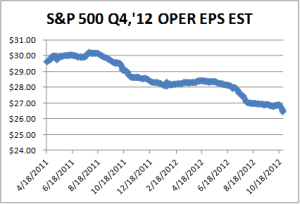Remember when I said we would see more volatility as the negotiations played out in the press? Today’s front-page article in the Wall Street Journal (WSJ), “Obama Sets Steep Tax Target,” discusses how the President is using his proposed budget, with $1.6 trillion in additional revenue, as a starting bid. This is twice the additional revenue that he and Boehner were talking about in their last set of negotiations and is a nonstarter from the Republicans’ point of view. Surprise—stocks are down again this morning.
Obama is also reported to be under pressure from the left on the budget. Yesterday’s WSJ had “Labor Pressures Obama on Budget” on page A6, which was confirmed in today’s New York Times (NYT) with “Obama Tells Labor Chiefs He Won’t Yield on Budget.” Earlier this week, we saw the Republicans playing to their base; now we see the same with the Democrats.








